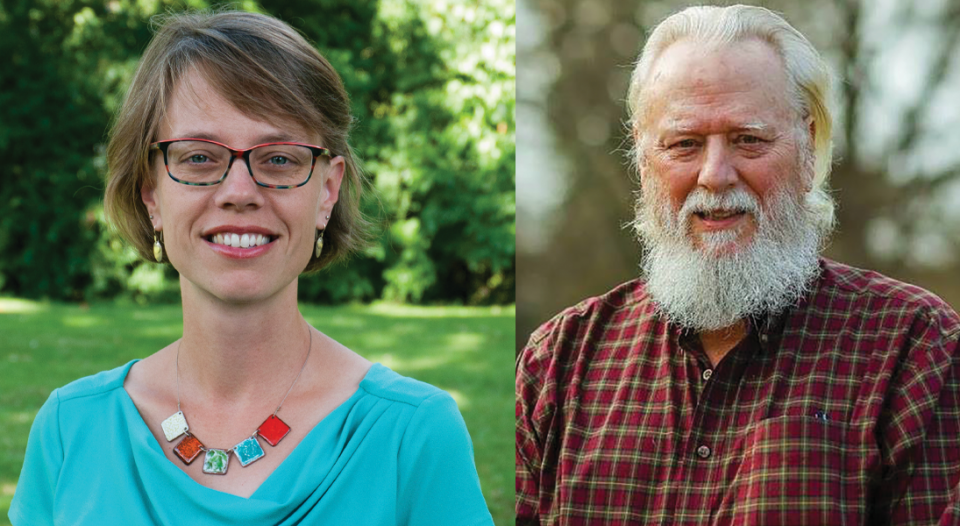Sarah Hinlicky Wilson holds many titles—Lutheran pastor, author, professor, theologian and cook, among others. She serves as a pastor of Tokyo Lutheran Church in Japan and is an affiliated faculty member at the Johannelund School of Theology in Uppsala, Sweden. She founded Thornbush Press and has written several books under its imprint.
She’s also a podcaster.
When she decided to launch a podcast on theology, she asked herself, “Who would I actually want to talk to theology about, week after week?” She landed on her dad, Paul R. Hinlicky, also a Lutheran pastor, theologian and writer, and a professor at Roanoke College in Salem, Va.
Living Lutheran asked Hinlicky Wilson about her podcast, Queen of the Sciences, in which the father-daughter co-hosts discuss a variety of topics pertaining to the Christian faith, including the Bible, theology, doctrinal topics and practical questions, as well as what she calls “wildly speculative ones.”
Living Lutheran: Could you describe Queen of the Sciences?
Hinlicky Wilson: “Queen of the Sciences” was the title accorded to theology in medieval times, the highest honor they knew how to pay to any area of study. Nowadays people—including Christians—consider theology to be anything but a serious field of study, much less a science. So I get a chuckle out of the irony of the title. The subtitle only adds to the humor: “Conversations Between a Theologian … and Her Dad.” My dad, Paul R. Hinlicky, is a far more accomplished theologian than I am! It really ought to be “Conversations Between a Theologian … and His Daughter.” But this way was more fun.
What made you decide to start the podcast?
A few years ago, my dad had a stroke out of the blue. He’s doing fine now, but, as so often happens to middle-aged people like me, I was forced to realize that my dad is not immortal. I wanted a permanent audio record of the theological conversations we’ve been having since I was a teenager. In fact, last year, we recorded by voice just such an exchange we [had via handwritten notes] when I was 15. The idea that our conversations could benefit others was just an added bonus.
Theology is just how Christians think.
How do you choose topics for the show?
Basically, we brainstorm together. We’ve covered topics where one or the other of us has some area of expertise, essentially teaching the other, [such as] the book of Joshua [or] French Orthodox theologian Elisabeth Behr-Sigel. Other times we share a mutual enthusiasm: the Gospel of Mark [or political theorist] Hannah Arendt. More rarely, we address current topics of debate: virtual communion, on being white and Christian, critical social theory.
We also do bonus episodes when one or the other of us has a new book come out or gives a public lecture. I try to make sure we have a broad array of topics over the course of each season: books of the Old and New Testament, patristic and medieval theologians, modern figures, philosophy, specific doctrines and, also, issues in pastoral ministry, since we’re both ordained pastors.
What have some of your favorite episodes been since launching in early 2019?
In “Learning to Love Leviticus,” I shared with Dad my great enthusiasm for this much-despised [by some] book of the Old Testament, showing how the building blocks of both meaning and metaphysics in the New Testament are found there. In our two episodes on Acts, I persuaded Dad that there was more to this earliest book of church history than a triumphal march of “this-worldly” progress and explained the meaning behind the abrupt ending that never tells us what actually happened to St. Paul.
Dad is a longtime scholar of intellectual history, and, this year in particular, he has walked me [and the listeners] through the deep roots of the confusion and polarization that have manifested in American culture. And I don’t think I ever really understood Galatians until our two-parter on that particular book!
What do you hope your audience will take away from listening?
Growing up with a theologian as I did, I’ve always felt at home in that territory, but I haven’t failed to notice how alienated most Christians—indeed most pastors—feel from their very own discipline. This is a terrible catastrophe. Theology is just how Christians think. It should be neither [difficult to understand] nor boring! I hope listeners will find our enthusiasm for theology infectious, and they’ll start to care passionately about trinitarian dogma, justification by faith, atonement and all the other topics that are both our great heritage and our living faith.
Find out more about Queen of the Sciences at sarahhinlickywilson.com/podcast. Learn more about Sarah Hinlicky Wilson, and sign up for her newsletter Theology & a Recipe, at sarahhinlickywilson.com. Learn more about Paul Hinlicky at paulhinlicky.com.




